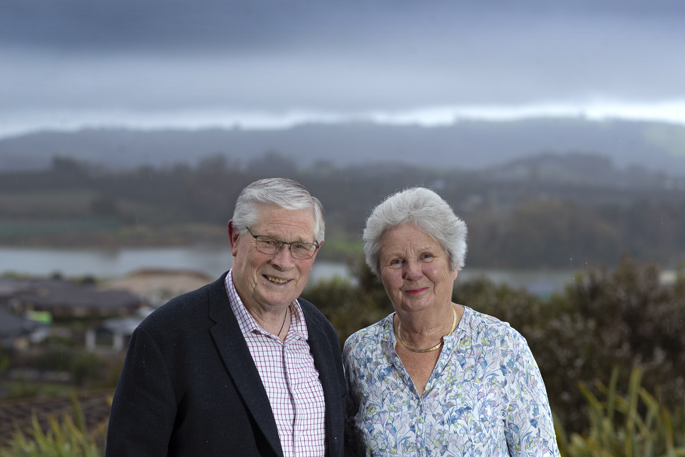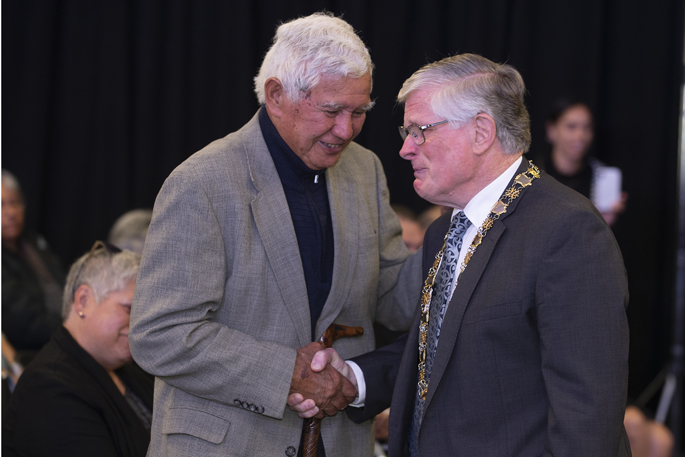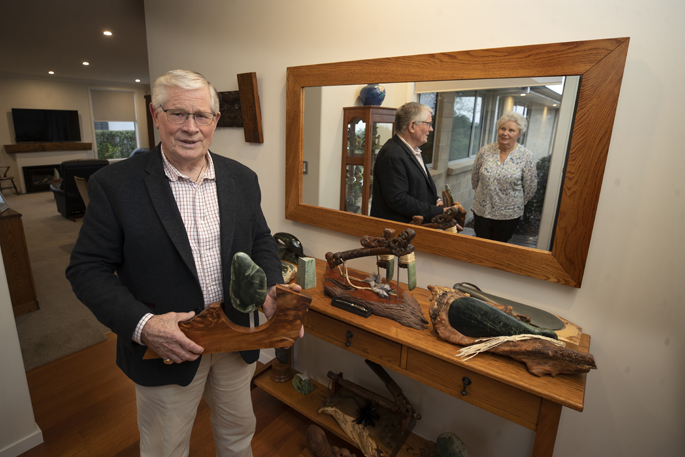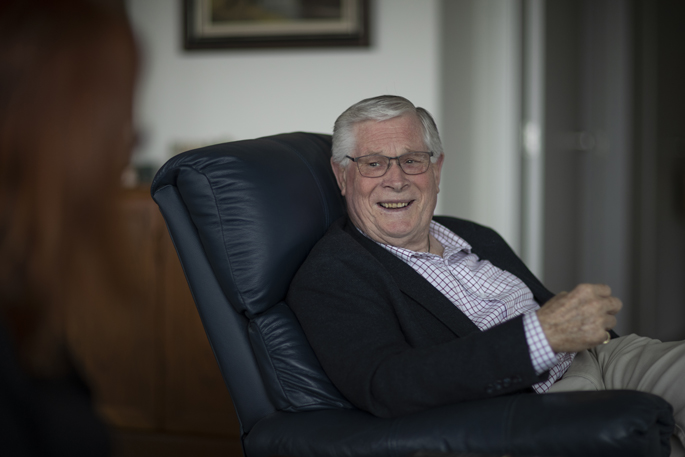Western Bay of Plenty mayor Garry Webber is standing down after 12 years on council.
Local Democracy Reporter Alisha Evans sat down with him to discuss his career and retirement plans.
'I'm not known for my patience,” professes Webber from the living room of his Ōmokoroa home.
Looking out at the view over Tauranga harbour toward Mauao you can understand why the 76-year-old would want to hang up his mayoral chains and spend more time there.
Webber served two terms as mayor, two as a Kaimai Ward councillor and started his tenure in local government with two years on the Ōmokoroa Community Board.
'If you talk to my children, this job [of mayor] I've got now is the third job I've had in retirement.”
Webber and his wife Carole 'retired” to Ōmokoroa in the early 2000s after his long career with Fonterra.
But he swifty took on a role with Ballance Agri-nutrients, then a became a board member of the Child Cancer Foundation, before settling into local body politics.
Webber's decision to retire was based on his firm belief that 'no-one over 75 should be nominated for local government”.
'When you go into local government and you swear your allegiance, it's to work for the current and future generations.”
He said councils are designing communities for the future so 'you need people that are current in their thinking”.
Webber's aforementioned lack of patience pertains mainly to the business of council meetings. Where, in his view, councillors are expected to have read the agenda and reports prior, then 'be prepared to have the debate”.
'If you haven't read the papers, you shouldn't be at the table.”
Although, a softer side of the self-professed pragmatist appeared during his farewell speech at the final Western Bay of Plenty District Council meeting for the triennium.
He was visibly emotional and finished his speech with 'I'm not good at farewells”. After paying respect to his fellow councillors and their partners for the work they had achieved together.
 Garry and his wife Carole are looking forward to their trip exploring the South Island. Photo: John Borren/SunLive.
Garry and his wife Carole are looking forward to their trip exploring the South Island. Photo: John Borren/SunLive.
When asked if it was a challenge progressing from councillor to mayor, Webber said it was a 'very big step up”.
'If you're going to do the mayoral thing properly, the demands on your time, it is a full-time job.”
'I was fortunate, I'd worked in the dairy industry, and those cows don't have a clock.”
Webber said as mayor he would get calls at all times of the day and a lot of weekends were spent attending community events.
'The obligations you have as a mayor, that is part of being a mayor. To me, it has not been a problem.”
He lists some career highlights as standardising rates across the district, that runs from Waihī Beach to Otamarakau, instead of it being different in each of the towns, as well as managing down debt.
'When I came into local government here, we had incredible debt. And our population has grown by about 60 per cent from when I first got on council, to what it is today.”
The estimated population in 2021 was 58,100, in 2006 it was 41,826, according to Statistics New Zealand.
Webber said the debt was close to $150m 12 years ago and now it is down to around $80m.
This has however, come at a cost to the rate payer in 2014 the Western Bay of Plenty District Council had the highest household rates in the country - an average of $3274 a year.
Although, this too has improved over time, for the 2020/21 financial year the average rates bill for a Western Bay of Plenty household was $2977.
The council is now ranked 13th in the country for average household rates, according to the Ratepayers' Report produced by the lobby group New Zealand Taxpayers' Union.
'We've been able to manage the business [and] do a whole lot of things, but at the same time, take our debt down. And that's just by being financially prudent and managing things really hard.”
 The outgoing mayor spent 12 years on council. Photo: John Borren/SunLive.
The outgoing mayor spent 12 years on council. Photo: John Borren/SunLive.
Webber credits a lot of this to the council staff who are the 'essence of the organisation”.
'I've been really well served at Western Bay with the calibre of the staff.”
He said the work they do, their consultation with the community, and information provided to councillors made decision making 'pretty damned easy”.
The outgoing mayor said when it came to reports he wanted staff to 'take all the emotion out of them”.
'Give us the evidence so we can make decisions on the evidence, not on the emotion.”
His biggest highlight, but equally a challenge, was the return of Panepane Purakau (Panepane Point) on Matakana Island to mana whenua.
After a unanimous vote by council in October 2020, the land was returned to the five Ngai Te Rangi hapū of Ngai Tuwhiwhia, Ngati Tauaiti, Te Ngare, Te Whānau a Tauwhao and Ngai Tamawhariua, that connect to Panepane Purakau.
The land the at south-eastern tip of the island, that borders the Tauranga Harbour channel, had been owned by the Western Bay of Plenty District Council since 1989.
Previously, ownership was in the hands of the subsequently disestablished Tauranga Harbour Board after being acquired under the Public Works Act in 1923.
The land was originally confiscated following the 1864 battles of Gate Pa and Te Ranga.
Negotiations with iwi began in 2013, and more than 7000 public submissions were received on the proposal to return the land during public consultation. Of those submissions 7098 were for the proposal with just 261 opposed.
 Webber and Ngai Te Rangi kaumatua Hauata Palmer after the decision to return Panepane Purakau to iwi. Photo: WBOPDC.
Webber and Ngai Te Rangi kaumatua Hauata Palmer after the decision to return Panepane Purakau to iwi. Photo: WBOPDC.
'It was a very difficult project to be part of, but it was the right thing to do,” said Webber.
'We [council] were trying to correct something that was an injustice in 1923.”
When asked was difficult about it, he said it was 'getting the significant majority to just hear the evidence” as well as some of the backlash he received from a small minority of the public.
He said the council 'got the land for nothing” and the ratepayers 'were no worse off” in returning it.
Under the transfer agreement a seven-hectare public reserve was created to ensure public access to the foreshore was protected in perpetuity.
At the time, Ngai Te Rangi kaumatua Hauata Palmer said it was a 'great result for our whole community”.
'This hasn't been easy, but nothing worthwhile comes about without hard work, unwavering focus and perseverance.”
 Garry Webber jokes he enjoys working with native timber and rocks because 'they don't talk back”. Photo: John Borren/SunLive.
Garry Webber jokes he enjoys working with native timber and rocks because 'they don't talk back”. Photo: John Borren/SunLive.
Webber comes alive when asked how he plans to spend his retirement.
'My hobby is playing around with New Zealand rocks, mainly greenstone, and New Zealand native timbers.”
On shelves and cabinets around the home are polished pounamu and semi-precious gems, like amethyst, lovingly mounted on native timber.
A patu he carved from solid pounamu sits proudly in the front entrance along with the remaining rock it came from.
Carole subtly jokes that she used to have a large China collection that is slowly losing pride of place.
When asked how she feels about finally having her husband back she replied: 'I've never really had him”.
The pair have a one-way ferry ticket to the South Island booked for December 'with no plans to return at this stage”.
I imagine when they do the car will be weighed down slightly with a new collection of rocks destined for the amateur geologist's next piece of art.
Public Interest Journalism funded through NZ on Air.




0 comments
Leave a Comment
You must be logged in to make a comment.